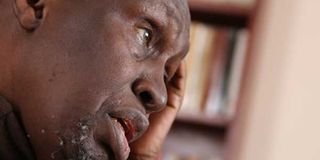Lessons on racism from Ngugi trip to S. Africa

Author Ngugi wa Thiong’o who witnessed first-hand the simmering racial tensions between black and white South African students during one of his lecturers at the University of Cape Town. PHOTO | FILE
What you need to know:
- At the University of Cape Town event, one member of the Pan Africanist Student Movement of Azania interrupted the lecture to request Ngugi to ask the “oppressors to leave” the venue before the lecture started.
- Apparently, some black students feel white students do not actively participate in social movements. One of those movements, #Fees Must Fall, saw protests across various universities in SA after the ministry of education announced a fees hike.
- Historically, students in South Africa have been at the centre of major protests that have changed the course of the country. They were at the forefront of apartheid protests.
Last month, acclaimed Kenyan author, Ngugi wa Thiong’o was witnessed first-hand the simmering racial tensions between black and white South African students during one of his lecturers at the University of Cape Town based on his famous essay: ‘Decolonising the Mind: the Politics of Language in African Literature.’
The lectures titled: “Decolonise the Mind, Secure the Base”, seek to deconstruct the effects of colonialism on African languages, education and social systems and economies.
Interestingly, the university was grounds for a major revolt last year when students forced the administration to remove a statute that was deemed to celebrate the ‘colonial hold’ on the institution.
Ngugi’s lecture was among the many he has held in South African universities in recent years. At the University of Cape Town event, one member of the Pan Africanist Student Movement of Azania interrupted the lecture to request Ngugi to ask the “oppressors to leave” the venue before the lecture started. “How do we have a lecture and form a consolidated voice, as the oppressed, in the presence of those who oppress us?” asked the student.
APARTHEID PROTESTS
Ngugi averted the situation by giving an example of his experience working as a minority. He said that when he first arrived as a lecturer in the US, he had to learn to work with his white counterparts to ‘bring change within.’ Ultimately, his message was that some actions fuel unnecessary racial tension.
Apparently, some black students feel white students do not actively participate in social movements. One of those movements, #Fees Must Fall, saw protests across various universities in SA after the ministry of education announced a fees hike.
The other, #RhodesMustFall, started at the University of Cape Town in March 2015 as a protest against commemoration of British imperialist Cecil Rhodes. The statute that was perceived as an enduring icon of colonialism and apartheid was removed a month later.
Ngugi’s lecturers are appropriate as tensions have been high as debate on effects of colonialism rages in many universities.
Students interviewed on the incident during Ngugi’s lecturer explained their misgivings about white students attending Ngugi’s lectures.
“I don’t know why whites insist on attending events where issues concerning blacks are being discussed. They enjoy conflict and come knowing their presence will be challenged,” said one.
Historically, students in South Africa have been at the centre of major protests that have changed the course of the country. They were at the forefront of apartheid protests.
Beyond racial power relations that ‘Decolonise the mind, Secure the Base’ questions, Ngugi reiterated why Africans must take pride in their languages.
“Knowledge of mother tongue is power, the lack of is enslavement. Colonialists gave us their accents in exchange for their access to our resources.”




